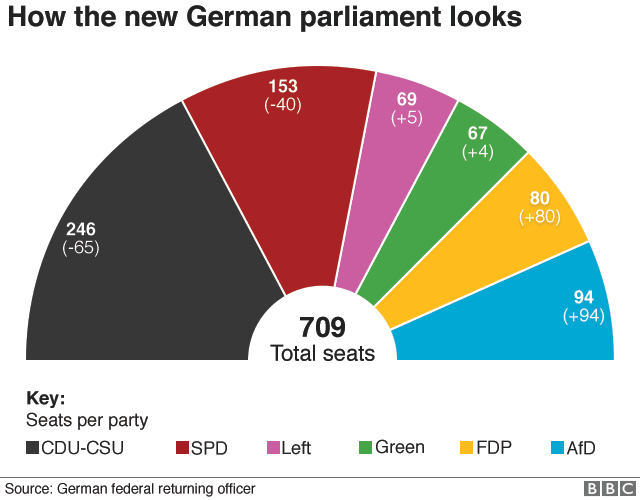Germany's Merkel suffers blow as FDP pulls out of coalition talks
Talks on forming a coalition government in Germany have collapsed, leaving Angela Merkel facing her biggest challenge in 12 years as chancellor.
The free-market liberal FDP pulled out after four weeks of talks with Mrs Merkel's CDU/CSU bloc and the Greens.
FDP leader Christian Lindner said there was "no basis of trust" between them.
What happens next is unclear, but Mrs Merkel has met President Frank-Walter Steinmeier, who has the power to call elections.
Mrs Merkel said she regretted the collapse, adding she would formally tell the German president that negotiations had failed.
CDU deputy chairman Armin Laschet told journalists that Mrs Merkel had held a conference call on Monday morning with the party leadership and had retained its support.
Mrs Merkel's bloc won September's poll, but many voters deserted the mainstream parties.
"As chancellor, I will do everything to ensure that this country is well managed in the difficult weeks to come," she said.
Back to the ballot box?
Analysis by the BBC's Jenny Hill in Berlin
This is - for post-war Germany - an unprecedented political crisis that could spell the end of the Merkel era.
Weakened by a poor election result in September, the proposed coalition was Mrs Merkel's only shot at forming a new government.
Germany will now - in all probability - have to go back to the ballot box. But it's not at all certain that Mrs Merkel's party will want her to lead them into a fresh election.
The ensuing uncertainty has consequences beyond Germany. Mrs Merkel - who did not attend a summit of EU leaders in Sweden last week - will remain preoccupied with domestic affairs for some time yet. This was, she said last night, a time for deep reflection.
Mrs Merkel must now fight for political survival. The leader who for so many people has represented stability now is fast becoming a symbol of crisis in the heart of Europe.
What went wrong in the talks?
It is not quite clear.
The parties involved in the talks are reported to be deeply divided over tax, asylum and environmental policies.
Although rumours had spread that a deal was close, the FDP's leader emerged from the venue in the middle of the night surrounded by his party colleagues and told reporters that the party was leaving the process.
He said that while the FDP knew it could not steer the course of the entire republic with just 11% of the vote, the parties involved in talks had "no shared vision" of how the country should be modernised, and four weeks of talks had left them with "many inconsistencies, unanswered questions and conflicts".
"It is better not to rule than to rule badly. Goodbye!" Mr Lindner said.
The co-leader of the Greens, Simone Peter, said the FDP had been "irresponsible, dubious and calculating".
Her party colleague Katrin Göring-Eckardt said the Greens had been "ready to talk" and found a "much greater understanding" with the CDU and FDP through the talks, especially over migration politics, climate change and agriculture.
Mrs Merkel blamed differing cultures and styles for the collapse but said: "We think we were on a path to finding a solution."
But a spokesman for her party, Stephan Mayer, told the BBC he did not think the FDP ever intended to join the coalition.
"I have the impression that... it was planned for a long time to quit the negotiations and not to form this coalition," he said.

One of the sticking points is reported to be whether Syrian refugees should be allowed to bring family members to join them in Germany.
Mrs Merkel's conservatives, mindful of the electoral success of the anti-Islam, anti-immigrant AfD, are cautious and want to extend a moratorium on allowing migrants to be reunited with their families. The FDP agree with them but the Greens say that the current freeze should be allowed to expire next year.
After winning its first parliamentary seats, AfD (Alternative for Germany) vowed to fight "an invasion of foreigners".
What happens next?
There are a few options.
Mrs Merkel could form a minority government, for instance with the Greens. But this would leave her having to patch together support for every vote - a big change for a leader who has been used to ruling as part of a grand coalition.
That coalition could return - Mrs Merkel's Christian Democrats joining with the second-largest party in parliament, the social democratic SPD, would have a comfortable majority. The SPD repeatedly ruled out this option - "voters have rejected" it, said leader Martin Schulz on Sunday - but they may be persuaded to change their minds.
Or there could be fresh elections. These would need to be called by President Steinmeier, after a long drawn-out process that would take months. Analysts say new elections would be likely to benefit the AfD most, so other parties would probably try to avoid them.
What reaction has there been?
France's President Emmanuel Macron, who alongside Mrs Merkel is a key player in the EU, said: "It is not in our interest that the situation becomes tense." A spokesman for his office said France was hoping for a "strong and stable" Germany.
A spokesman for the UK Prime Minister Theresa May said the talks were a matter for German politicians.
Margaritas Schinas, a spokeswoman for the European Commission, told reporters that she was confident Germany would keep having "stability and continuity" as provided for by the constitution.
Economically, the reaction was felt in the stock market, with Deutsche Bank shares down 1.3%. But after a dip the euro recovered slightly.
"Uncertainty is poison for the economy," said Jörg Krämer, the chief economist at Commerzbank.
"But the collapse of the talks can hardly be a shock for businesses after four agonising weeks of negotiations."
Comments